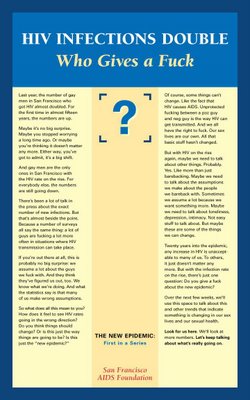 (Just one of many hostile ads funded by the SF health department with the SF AIDS Foundation.)
(Just one of many hostile ads funded by the SF health department with the SF AIDS Foundation.)Today's Bay Area Reporter features an excellent story by Matthew Bajko on the constant barrage of social marketing campaigns gay men in San Francisco are subjected to by AIDS Inc, and how some gay men, myself included, are demanding proof the ads are effective at HIV prevention and that we be allowed a time-out from the endless fear of the campaign.
Frankly, a debate about the manufactured controversies of many of the ads, and their incumbent hostility directed at gays, is long overdue and I look forward to participating in the debate during 2007.
From the BAR:
The billboard above Cafe Flore in San Francisco's gay district last year carried a New Year's resolution message. An unidentified person, presumably a gay man, pledged he wouldn't infect anyone with HIV in 2006.
The HIV prevention message was part of the long-running HIV Stops With Me campaign, begun in San Francisco and created by the locally owned Better World Advertising firm. The social marketing message sparked outrage in one gay man in his 20s, Trevor Hoppe, a newly arrived resident.
Hoppe wrote in a guest opinion published in the Bay Area Reporter last February that the seemingly innocuous message actually had "an insidious subtext." Hoppe found fault with the advertisement because it implied that "positive men, invisible to the naked eye, are apparently on the prowl – purposefully infecting unsuspecting HIV-negative youngsters. Hide your children!" he wrote. [...]
The criticism of his agency's work had Better World owner Les Pappas on the defensive, telling the B.A.R. in November that such campaigns are needed in order to stop the spread of HIV. [...]
Opponents of what they see as "fear-driven campaigns" counter that gay men are taking care of themselves, pointing to recent declines in both HIV rates and syphilis in San Francisco's gay male population. They have called for a two-year moratorium on all social marketing campaigns in order to dialogue with gay men on what types of messages should be directed at the community.
AIDS activist Michael Petrelis, one of the main proponents for the moratorium, said that after 25 years of living with the AIDS epidemic and countless HIV prevention messages "there is diminishing community buy-in to the campaigns."
The debate about HIV prevention messages will receive even more scrutiny this year, when the city's HIV Prevention Planning Council is expected to discuss concerns about the campaigns at either its February or March meeting.
Tracey Packer, interim HIV prevention director at the San Francisco Department of Public Health, said the HPPC's steering committee has already discussed the issue and she intends to have the entire council address what HIV prevention messages members feel are appropriate.
Packer said some of the questions that came up during the committee meeting were: what are the standards for social marketing; and, should there be a group to monitor the messages that are produced? [...]
Supervisor Bevan Dufty said he endorses having a community-wide discussion about the tone of HIV prevention ads. He said he intends to bring his concerns to the HPPC at its January meeting. [...]
"At one level you want to try to penetrate and grab peoples' attention. At times the campaigns are so harsh you turn people off," said Dufty. [...]
Did Dufty really say harsh? Yes, he did. Maybe he was referring to the SF AIDS Foundation ad, paid for with city dollars, posted at top. Click here to read the full BAR story.

1 comment:
Hi Michael,
I thought that article was really interesting and well-written as well (by BAR standards at any rate). I am disturbed by the notion of 'moratorium' that I have read used in this context, viz. a 'moratorium' on HIV prevention advertising in San Francisco. What disturbs me is not really that there might not be enough discussion of HIV -- what disturbs me is the idea of any group/person/institution arrogating to itself the authority to to be the arbiter of what does or does not get said in the gay public.
On the other hand, I think perhaps the call for 'silence' on the subject is precisely a call to 'make visible' the interests or perspectives of some gay men who may be sick and tired of being preached at about their (our) sex lives. I'm fascinated by the notion that the absence of speech around HIV could be more powerful than lots of speech (imagery, etc.) around HIV; at least in the very specific local context of San Francisco.
Post a Comment